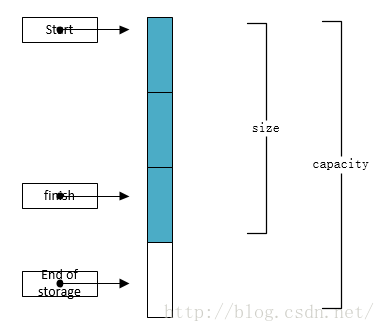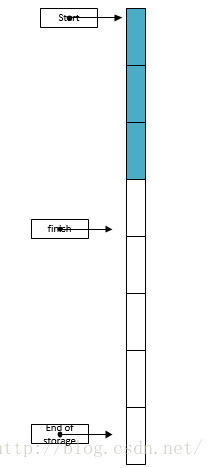vector是c++ stl中一种线性容器,本文将从vector底层实现的角度谈谈其实现原理。vector分配元素在内存中是连续存储的,本质是一个可变数组,当申请的空间在需要的时候默认以倍增的形式扩从。
template <class T, class Alloc=alloc>
class vector{
public:
typedef T value_type; //T是实际申请时的数据类型
typedef value_type* iterator;
typedef value_type& reference;
typedef size_t size_type;
protected:
iterator start; //指向数据的起始位置的指针
iterator finish; //指向数据最后一个位置的指针
iterator end_of_storage; //申请空间的结束位置指针
public:
iterator begin(){ return start; } //返回起始位置
iterator end(){ return end; } //返回结束位置
size_type size() const{ //返回容器中元素的数量
return size_type(end() - start());
}
size_type capacity() const{ //容器的大小
return size_type(end_of_storage - begin());
}
bool empty() const{ return begin() == end(); } //容器是否是空的
reference operator[](size_type n){ //[]操作符
return *(begin() + n;)
}
reference front(){ //返回第一元素
return *begin();
}
reference back(){ //返回最后一个元素
return *(end() - 1);
}
};
扩容前

扩容后(2倍增长)
void push_back(const T&x){
if (finish != end_of_storage){ //还有剩余空间
construct(finish, x);
++finish;
}
else{
insert_aux(end(), x); //空间不足 进行2倍增容
}
}template<class T,class Alloc>
void vector<T, Alloc>::insert_aux(iterator position, const T&x){
if (finish != end_of_storage){ //还有可用空间
construct(finish, *(finish - 1));
++finish;
T x_copy = x;
copy_backward(position,finish-2,finish-1);
*position = x_copy;
}
else{ //没有可用空间
const size_type old_size = size();
const size_type len = old_size != 0 ? 2 * old_size : 1;
//这里的分配原则:如果原大小为0,则分配1
//如果原来大小不为0,则分配原来大小的两倍
//前半段用了放放置原来的数据,后半段用来放置新数据
iterator new_start = data_allocator::allocate(len);
iterator new_finish = new_start;
try{
//将原vector的内容拷贝到新vector
new_finish = uninitialized_copy(start, position, new_start);
construct(new_finish, x);//新元素设置初值x
++new_finish;
new_finish = uninitialized_copy(position, finish, new_finish);
}
catch (...){
destroy(new_start, new_finish);
data_allocator::deallocate(new_start,len);
throw;
}
destroy(begin(), end());
deallocate();
//调整迭代器,指向新vector
start = new_start;
finish = new_finish;
end_of_storage = new_start + len;
}
}
最后
以上就是光亮玉米最近收集整理的关于深度探索vector的全部内容,更多相关深度探索vector内容请搜索靠谱客的其他文章。
本图文内容来源于网友提供,作为学习参考使用,或来自网络收集整理,版权属于原作者所有。








发表评论 取消回复